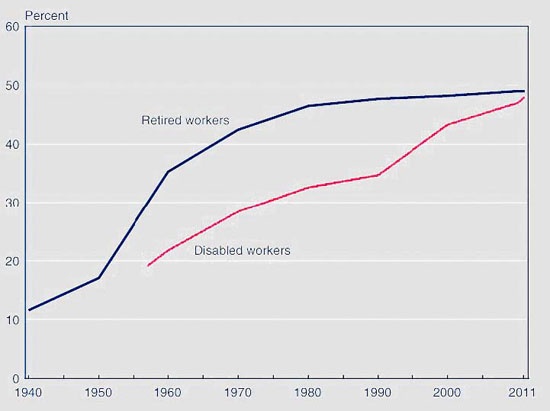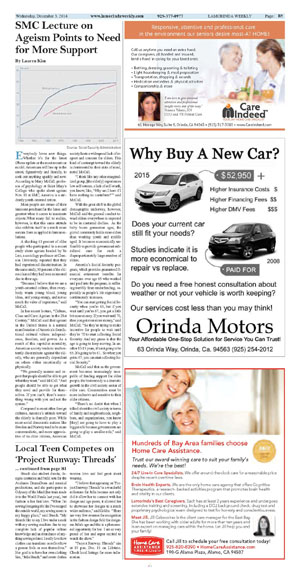|
|
Published December 3rd, 2014
|
SMC Lecture on Ageism Points to Need for More Support
|
|
| By Lauren Kim |
 |
| Source: Social Security Administration |
Everybody loves new things. Whether it's for the latest iPhone update or the most recent car model, Americans will line up in the street, figuratively and literally, to seek out anything sparkly and new. According to Mary McCall, professor of psychology at Saint Mary's College who spoke about ageism Nov. 11 at SMC, America is a stridently youth-oriented nation.
 Most people are aware of their innocent penchant for the latest and greatest when it comes to inanimate objects.What many fail to realize, however, is that this same attitude also exhibits itself in a much more serious form as applied to human relations.
Most people are aware of their innocent penchant for the latest and greatest when it comes to inanimate objects.What many fail to realize, however, is that this same attitude also exhibits itself in a much more serious form as applied to human relations.
 A shocking 63 percent of older people who participated in a recent study about ageism headed by Ye Luo, a sociology professor at Clemson University, reported that they had experienced discrimination. In the same study, 30 percent of the elders claimed they had been mistreated due to their age.
A shocking 63 percent of older people who participated in a recent study about ageism headed by Ye Luo, a sociology professor at Clemson University, reported that they had experienced discrimination. In the same study, 30 percent of the elders claimed they had been mistreated due to their age.
 "Because I believe that we are a youth-oriented culture, then everybody wants young blood, young ideas, and young energy, and not so much the value of experience," said McCall.
"Because I believe that we are a youth-oriented culture, then everybody wants young blood, young ideas, and young energy, and not so much the value of experience," said McCall.
 In her recent lecture, "Culture, Class and Care: Ageism in the 21st Century," McCall said that ageism in the United States is a natural manifestation of America's foundational cultural values: independence, freedom, and power. As a result of this capitalist mentality, American society tends to inadvertently discriminate against the elderly, who are generally dependent on others either emotionally or physically.
In her recent lecture, "Culture, Class and Care: Ageism in the 21st Century," McCall said that ageism in the United States is a natural manifestation of America's foundational cultural values: independence, freedom, and power. As a result of this capitalist mentality, American society tends to inadvertently discriminate against the elderly, who are generally dependent on others either emotionally or physically.
 "We generally assume and expect that people should be able to get what they want," said McCall. "And people should be able to get what they need and provide for themselves. If you can't, there's something wrong with you and not the system."
"We generally assume and expect that people should be able to get what they want," said McCall. "And people should be able to get what they need and provide for themselves. If you can't, there's something wrong with you and not the system."
 Compared to most other foreign cultures, America's attitude toward the elderly is dismally poor. While most social democratic nations like Sweden and Norway tend to be more communalistic, and more appreciative of its older citizens, American society hosts a widespread lack of respect and concern for elders. This kind of contempt toward the elderly is detrimental to their state of mind, noted McCall.
Compared to most other foreign cultures, America's attitude toward the elderly is dismally poor. While most social democratic nations like Sweden and Norway tend to be more communalistic, and more appreciative of its older citizens, American society hosts a widespread lack of respect and concern for elders. This kind of contempt toward the elderly is detrimental to their state of mind, noted McCall.
 "I think like any other marginalized group, [the elderly] experiences low self-esteem, a lack of self-worth, you know, like, 'Why am I here if I have nothing to contribute?'" said McCall.
"I think like any other marginalized group, [the elderly] experiences low self-esteem, a lack of self-worth, you know, like, 'Why am I here if I have nothing to contribute?'" said McCall.
 With the great shift in the global demographic underway, however, McCall said the general conduct toward elders everywhere is expected to be in continual decline. As the baby boom generation ages, the global community holds more elders than working youth and middle aged. It becomes economically unfeasible to provide government subsidized care for such a disproportionately large number of elders.
With the great shift in the global demographic underway, however, McCall said the general conduct toward elders everywhere is expected to be in continual decline. As the baby boom generation ages, the global community holds more elders than working youth and middle aged. It becomes economically unfeasible to provide government subsidized care for such a disproportionately large number of elders.
 America's Social Security program, which provides guaranteed financial retirement benefits for everyone over age 65 who worked and paid into the program, is suffering terribly from underfunding, especially as people's life expectancy continuously increases.
America's Social Security program, which provides guaranteed financial retirement benefits for everyone over age 65 who worked and paid into the program, is suffering terribly from underfunding, especially as people's life expectancy continuously increases.
 "You can start getting Social Security when you're 65, but if you wait until you're 67, you get a little bit more money. If you wait until 70, then you get even more money," said McCall. "So they're trying to make incentive for people to wait until they're 70 to start collecting Social Security. And my guess is that the age is going to keep moving. In another 10-15 years, it's not going to be 65. It's going to be 67. So when you get to 67, you can start collecting Social Security."
"You can start getting Social Security when you're 65, but if you wait until you're 67, you get a little bit more money. If you wait until 70, then you get even more money," said McCall. "So they're trying to make incentive for people to wait until they're 70 to start collecting Social Security. And my guess is that the age is going to keep moving. In another 10-15 years, it's not going to be 65. It's going to be 67. So when you get to 67, you can start collecting Social Security."
 McCall said that as the government becomes increasingly incapable of funding support for older people, the best remedy is a dramatic growth in the civil society sector of elder care. Communities must be more inclusive and sensitive to their older citizens.
McCall said that as the government becomes increasingly incapable of funding support for older people, the best remedy is a dramatic growth in the civil society sector of elder care. Communities must be more inclusive and sensitive to their older citizens.
 "There's no doubt that when I talked about the civil society in terms of family and neighborhoods, neighbors, and organizations, you know [they] are going to have to play a bigger role because governments are going to play a smaller role," said McCall.
"There's no doubt that when I talked about the civil society in terms of family and neighborhoods, neighbors, and organizations, you know [they] are going to have to play a bigger role because governments are going to play a smaller role," said McCall.

|
|
|
|
|
|
|
|
|
| |
|
|
|
|



